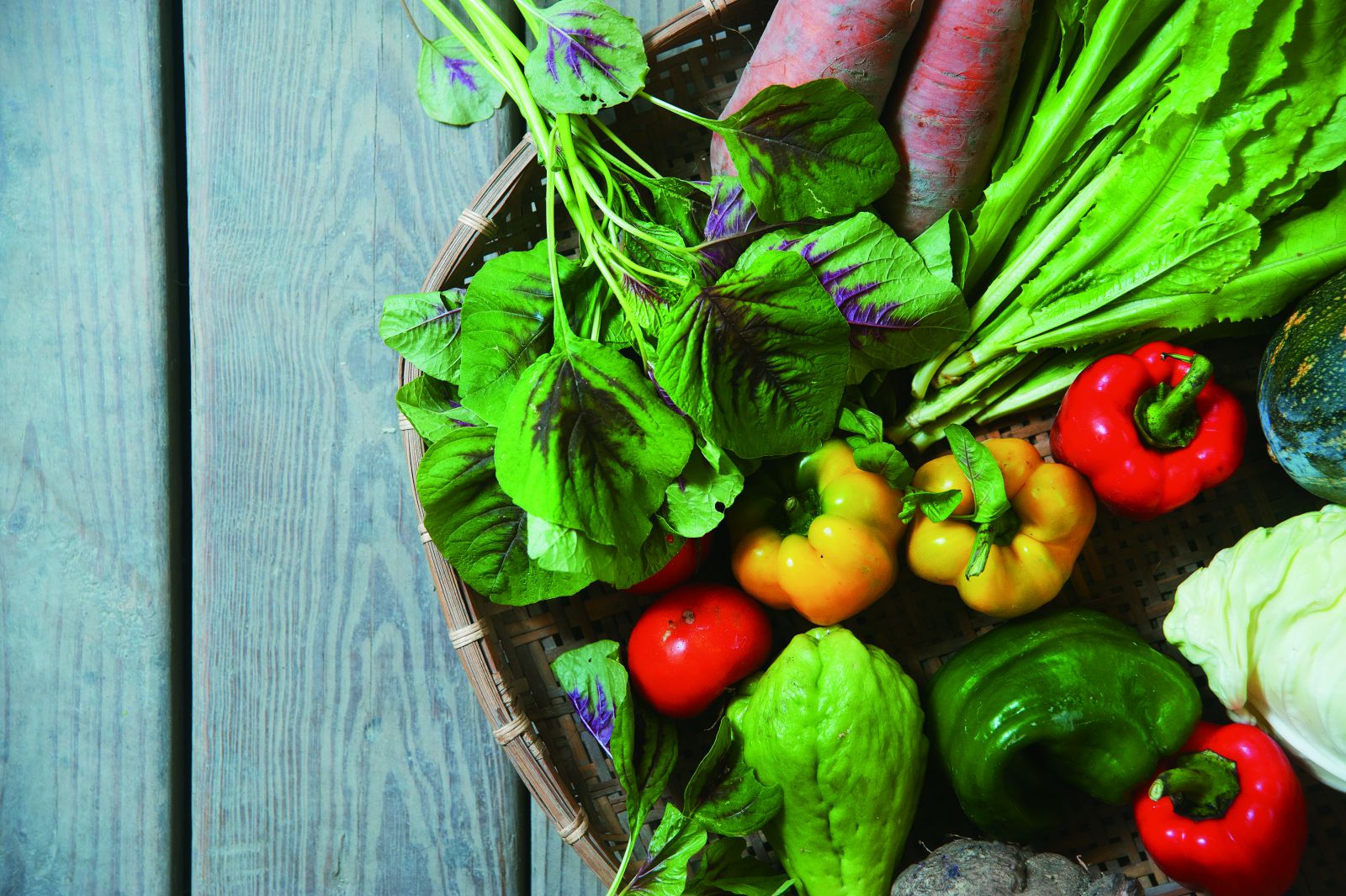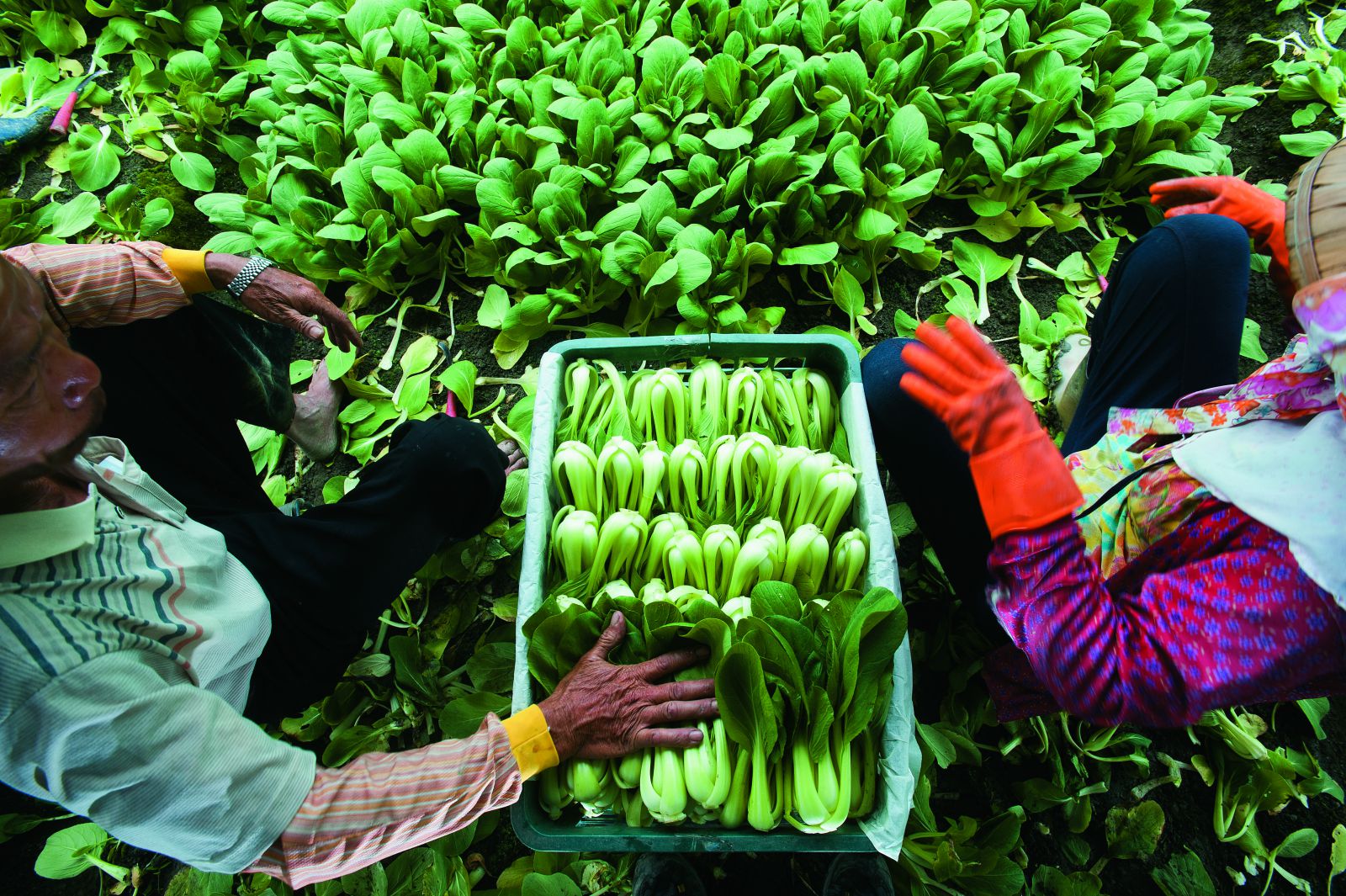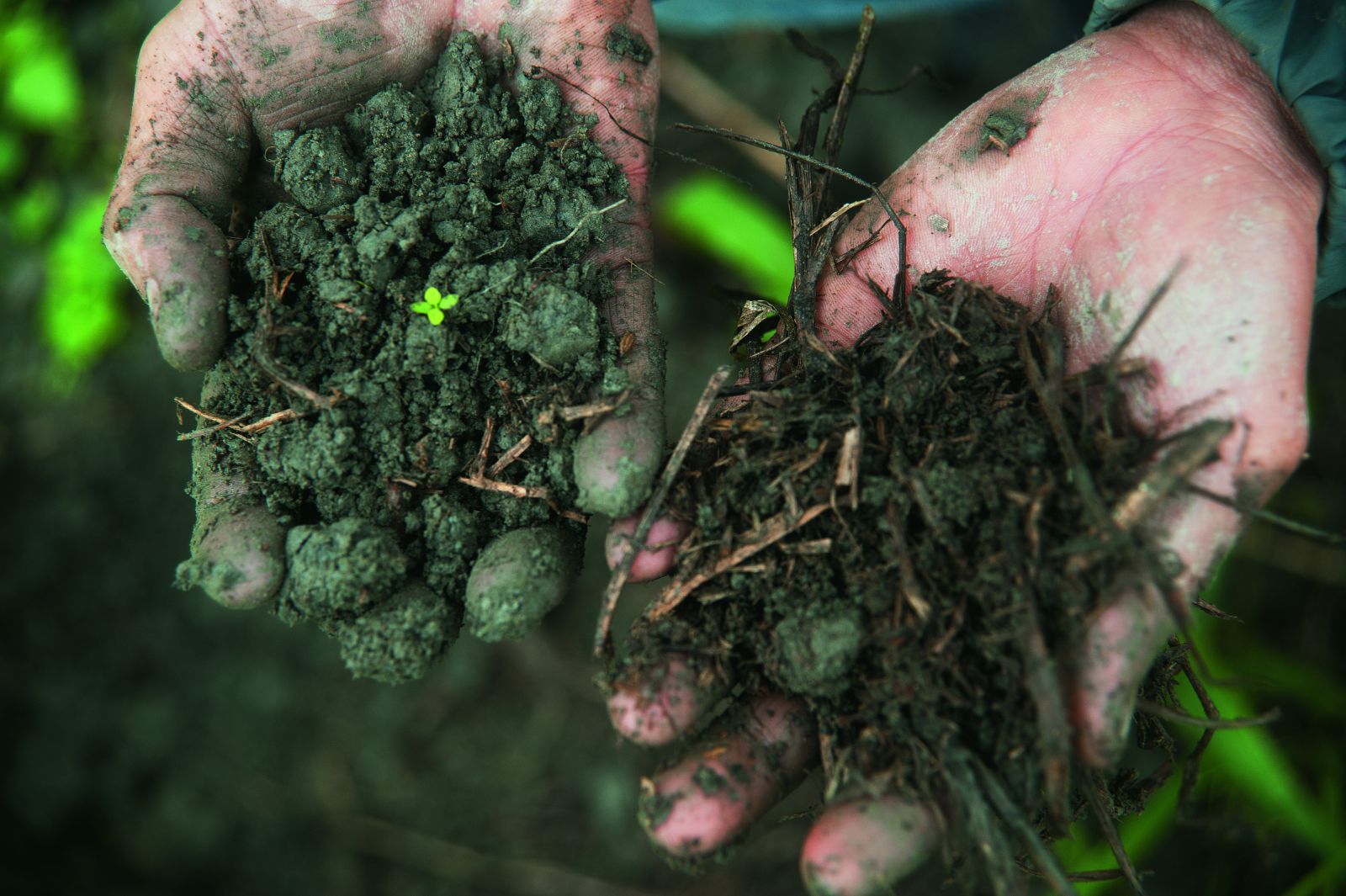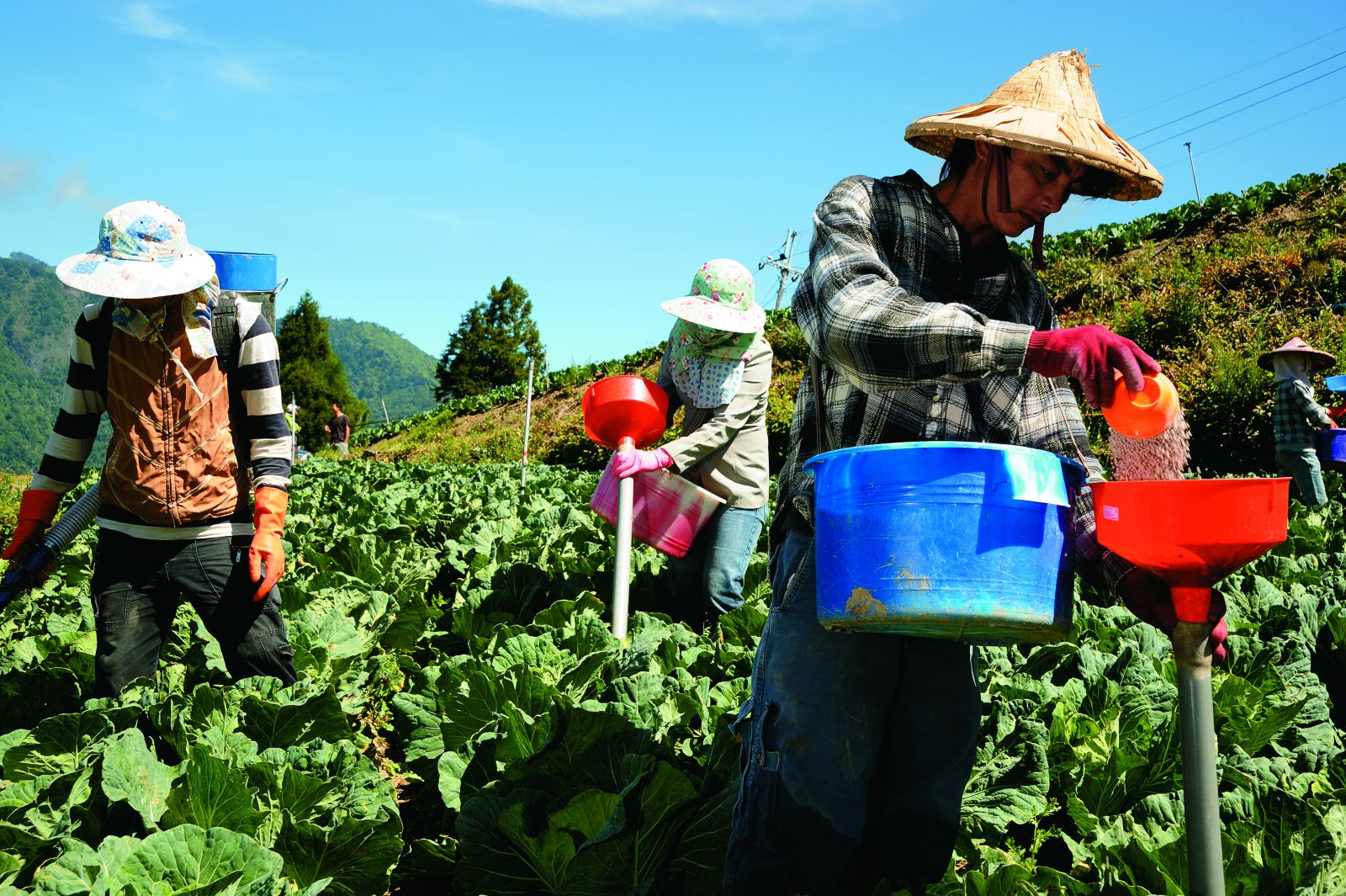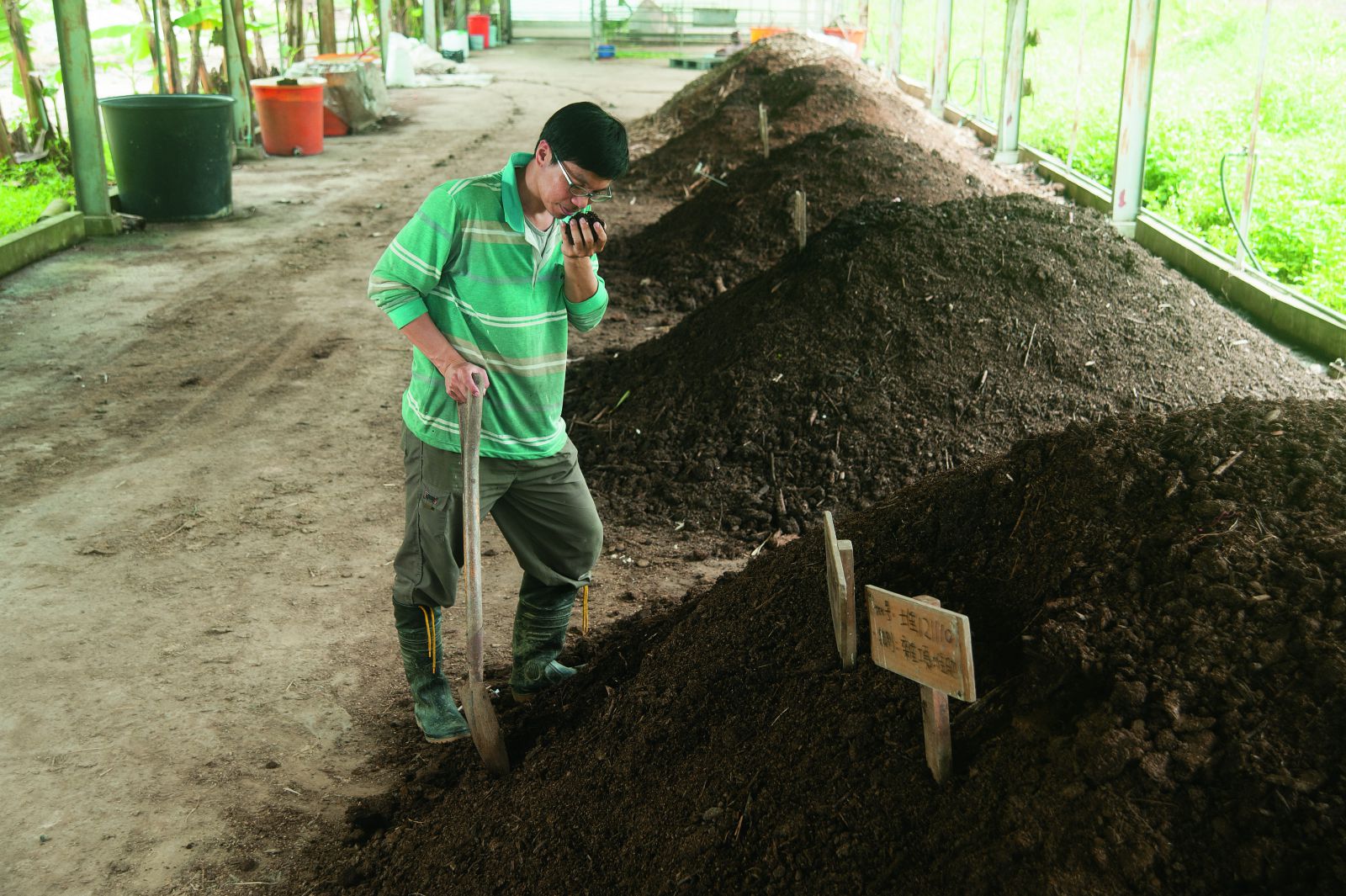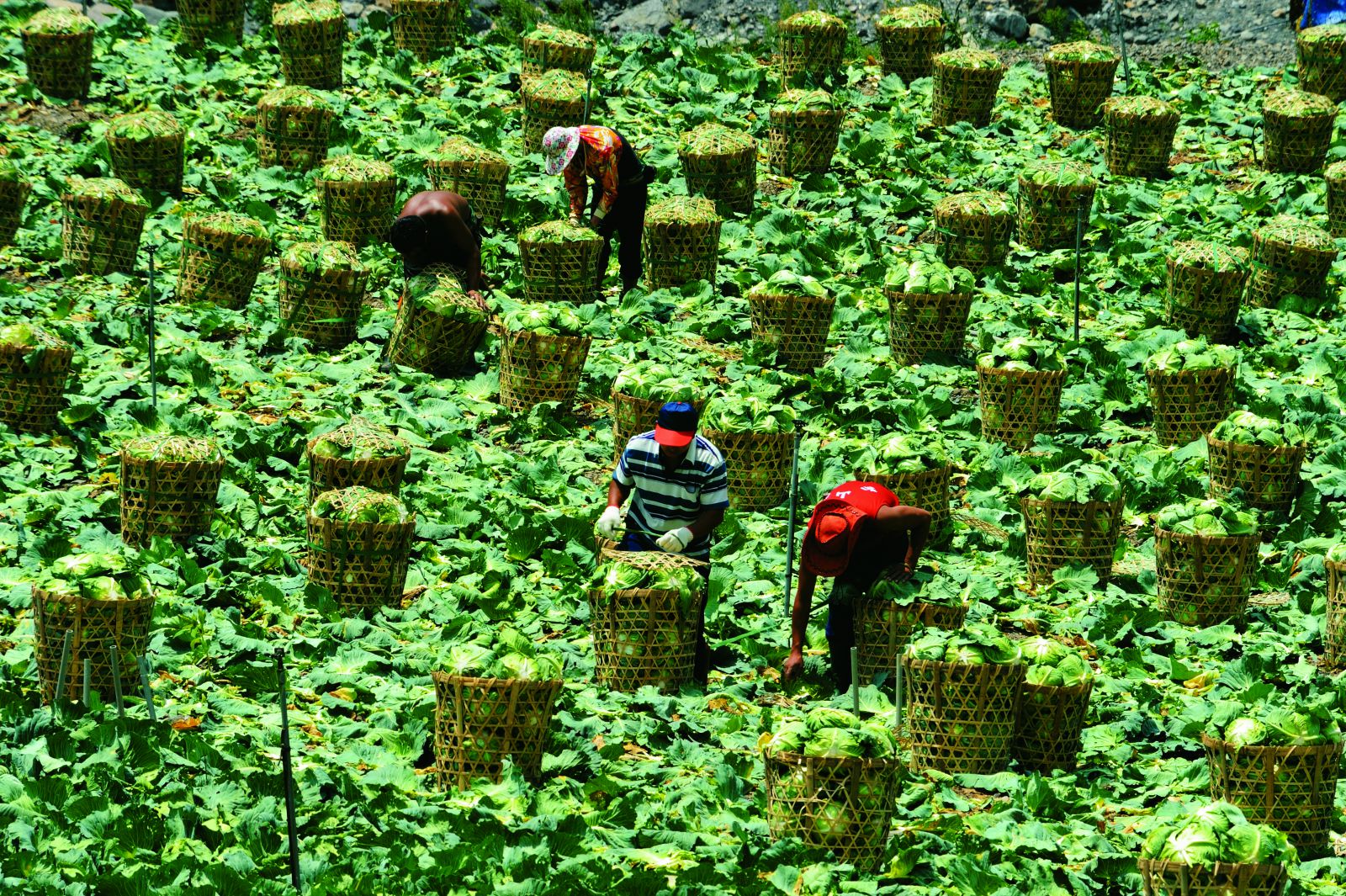

| The Two Faces of Nitrate | ||||||||||
| By Pan Mei-ling Translated by Tang Yau-yang Photos by Chen Hong-dai Used with permission of Rhythms Monthly Magazine | ||||||||||
Vegetables have long been the most trusted health food on the market. They supply fiber, minerals, vitamins, and other nutrients in abundance. Widely used in agriculture as a fertilizer, nitrate is a chemical compound that provides vegetables with essential nutrition. However, the excess use of nitrate in vegetable cultivation, while making the produce appealing on the outside, has made them much less nutritious or tasty on the inside.
Give plants the right combination of soil, sunlight, water and air, and nature will make the plants healthy and vibrant. In the case of vegetables, those resources will result in tasty produce for consumers. Farmers have long relied on this simple formula for wholesome harvests. However, at the end of the 19th century—a recent time in the long history of agriculture—some man-made changes began to confound this long-held wisdom and transform the landscape of modern agriculture. In the late 19th century, German chemists Justus von Liebig and Fritz Haber introduced the idea of applying chemicals in agriculture. Von Liebig was deemed the father of the fertilizer industry for his discovery of nitrogen as an essential plant nutrient. Haber won the Nobel Prize in Chemistry in 1918 for his development for synthesizing ammonia, which in fertilizer makes nitrogen nutritionally available to plants. Chemical agriculture was inaugurated soon afterwards and, especially after World War II, fundamentally revolutionized how farmers cultivate their crops. Certain compounds annihilate plant pests on one hand and stimulate vegetable growth on the other. Mainstream farmers have relied on chemicals such as nitrates ever since. In fact, the Haber method of fertilizer production is responsible for producing food for a third to half the world population today. All seems well, so what is the problem? As is usually the case, too much of a good thing turns out to be not so good. The downsides are chemical residues in food, diminished soil productivity, and soil pollution. Another problem is eutrophication, the depletion of oxygen in bodies of water. This happens when nutrients, primarily nitrogen and phosphorus from fertilizers or sewage, drain into rivers, lakes and seas, where they cause blooms of algae and harm other organisms. In Taiwan, the hot, humid weather often makes the use of pesticides a necessary evil. Statistics from the Council of Agriculture show that the Taiwanese agricultural industry used 36,529 metric tons (80 million pounds) of pesticides in 2005. That works out to 1,600 grams (3.5 pounds) for each resident. Where do all these pesticides go after being applied to plants? “Lacing food on a dining table with poison is unquestionably a punishable criminal act,” said Chen Hui-wen (陳惠雯), a farm owner who cultivates her land without resorting to chemicals. “However, what is essentially the same act—adding pesticides to agricultural plants—is happening far more often and is not being punished. Why?” Chen’s accusations are direct and strong, and they offer us much to ponder.
Superficiality In November 2012, the Taipei City Government Department of Health sampled the nitrate content of vegetables in various parts of Taiwan and published the findings in the first official report ever on nitrate levels in vegetables. The study showed a severe excess of nitrate in the vegetable supply, especially in leafy vegetables such as cabbage, water spinach, spinach, Napa cabbage, and baby bok choy. The levels registered far more than 5,000 parts of nitrate per million. As a reference, the limits set by the European Union are between 2,000 and 5,000 ppm. In the EU, each hectare of farmland is permitted to use up to 170 kilograms of nitrogen in fertilizers, a limit exceeded in Taiwan three times over. Nitrogen-rich fertilizers are the main cause of high concentrations of nitrates in vegetables. Mainstream farmers in Taiwan cultivate their vegetables using large amounts of such fertilizers to raise their yield, so it is no wonder their produce abounds in nitrates. The Department of Health recommended as countermeasures that consumers either soak their vegetables in warm water for 20 minutes or boil them. Tests have shown that boiling vegetables for three minutes effectively removes 80 percent of the nitrate. Unfortunately, these recommended methods also remove water-soluble vitamins and render the vegetables mushy. Chinese people generally favor their vegetables vibrant and crispy, which only quick stir-frying can deliver. No wonder Huang Jia-lin (黃嘉琳), secretary general of the Homemakers United Foundation, a consumer advocacy group in Taipei, sneered, “Who in Taiwan cooks their vegetables this way?” In a sense, high-nitrogen fertilizers are like illicit drugs in that they give users quick, huge boosts of energy. But the effect wears off as the law of diminishing returns kicks in. Li Guang-ren (李光仁), a young organic farmer in Miaoli, northern Taiwan, offered this view: “Farmers these days are afraid that the bare land is not good enough, so they use more and more chemical fertilizers. This results in harmful vegetables. Another downside of this careless use of fertilizers and insecticides is that eventually the soil can’t bear it anymore and dies of exhaustion.”
Nitrate: good or bad? Nitrate by itself does not hurt people’s health. In fact, our bodies even produce nitrate, which is converted into nitric oxide, an important chemical in the human immune system. But when it enters the digestive tract, it is broken down into harmful nitrous acids. These acids combine with amines, which can be found in a variety of foods, to form dreadful carcinogens. So is nitrate good or bad? It is good if used within the safety margin. The EU first stipulated in 2001 that the upper limits of nitrate concentration in vegetables be between 2,000 and 4,500 ppm, depending on the variety of vegetable and the harvest season. China has its own limits on roots, leafy vegetables, and other kinds of produce. In Japan, producers regulate themselves. Taiwan, on the other hand, has none of these safeguards. The Taiwanese Ministry of Health and Welfare has not set limits on nitrate concentration in vegetables, although it has set a limit of 70 ppm for processed meat products such as sausage. In the absence of a legal cap, leafy vegetables are regularly sold to consumers with nitrate concentrations in excess of 5,000 ppm. “Consumers must recognize that nitrate content in their food is a topic that deserves their attention,” said Dr. Lin Bi-xia (林碧霞), a founding member of the Homemakers United Foundation and an advocate for food safety. “Only when they pay attention and make their demands known will producers pay heed and rein in their behavior.” Lin has been a crusader against the excessive use of nitrates for more than 20 years. It appears that she is fighting an uphill battle. Agriculture officials have also long advocated reasonable, not excessive, use of fertilizers. They started offering workshops on the topic in 1997, and they give as many as 200 workshops a year. There have been some converts, especially among younger farmers, but the effect has been less than ideal. Often their advice, however convincing, is ignored when farmers hear fertilizer ads or other farmers promising that the simple use of chemicals will give them higher production volumes as well as produce that is impeccable in appearance. Farmers, however, defend their ways of doing things too. An old farmer summed it up quite succinctly: “It’s all because you city folks demand flawless leaves that we keep adding chemicals to our crops.” In a market economy, consumers generally get what they want, good or bad.
Is organic better? Those who are disheartened by the current situation may seek to get their vegetables from organic sources. But is buying organic any guarantee of getting less nitrate? We bought two bunches of vegetables, one organic and the other grown in the regular way. Then we took them to a company in Taipei that sold test strips for chemicals. We took 20 grams (0.7 ounce) of vegetable from each bunch, put each separately in a blender, and then added one liter (about one quart) of water to dilute the pulp. Then we tested both samples for nitrate using the test strips. We were surprised by the results. Contrary to our expectations, the organic sample showed a high concentration of nitrate. Here is a probable explanation. Organic farmers used only organic fertilizers. That being the case, they might have used them liberally, thinking that organic fertilizers were harmless. But they did not know that their fertilizers contain mostly organic nitrogen, thus leading to the high level of nitrate in the test result. As with many things in life, even the wonder stuff of nitrogen and nitrate can be too much of a good thing, and that goes for organic food too.
The wisdom of moderation Everything in moderation. This advice apparently applies to the use of nitrate, too. Nitrate is good if used in reasonable quantities, but it becomes bad when used in excess. “Used properly, nitrate can produce very good, delicious vegetables,” noted farmer Peng Kang-wei (彭康偉). Another essential ingredient for good vegetables, according to him, is sufficient time for photosynthesis. He asked me to close my eyes and imagine vegetable leaves as solar panels soaking up sunlight. Give vegetables enough time to absorb sunlight and transform fertilizers into nutrients and they grow into healthy plants. When cooked, they taste very good, unlike the mushy, salty taste of over-fertilized vegetables. Excessive use of fertilizers may help plants to grow more quickly, but the vegetables become weak internally. Chen Bi-lang (陳碧郎), another farmer who grows low-nitrate vegetables, said that vegetables that are high in nitrate content decay more quickly. He said repeatedly that healthy vegetables should taste good and last longer. It appears that only consumers can ultimately tell farmers not to use excessive nitrates or any other chemicals on their crops. Consumers need to ditch the harmful habit of favoring vegetables that are impeccable in outer appearance—which, they need to realize, is but skin deep.
|














|

